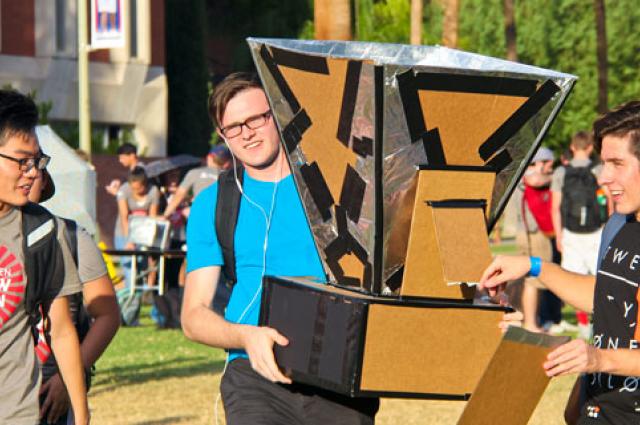UA Engineering Freshmen Test Their Solar Power Know-How
University of Arizona College of Engineering freshmen caught a lucky break October 14 when the sun burst through clouds minutes before the start of the 2015 Solar Oven Throw Down, the annual demonstration of mathematical modeling, engineering design and teamwork that has become a rite of passage since the first contest six years ago.
But luck had little to do with the solar ovens made by nearly 500 freshmen in teams for ENGR 102, the College’s required introductory course. The ovens displayed on the UA Mall reflected six weeks of hard work learning and applying core concepts in math, physics, materials science and mechanical engineering; poring over Excel spreadsheets; and testing and retesting their ovens’ ability to harness the sun’s power and cook a bun.
All ovens had to be built to precise specifications using commonly available materials like cardboard, black construction paper, aluminum foil, Mylar sheets, newspaper and duct tape.
Each team’s main objective was to accurately predict the highest temperature their oven would reach at the Solar Oven Throw Down and achieve the highest score on a performance index. They competed on other criteria, too, such as predicting average temperatures and designing cost-effective ovens.
Lessons in Perseverance and Teamwork
The project required complex calculations, multiple refinements and collaborations that didn’t necessarily come easily.
After testing the prototypes a few weeks before the event, teams returned to the drawing board to find solutions for melted duct tape, improperly positioned reflectors, inadequate cooking chambers and faulty insulation.
“The most challenging component was construction of the reflectors,” said Raymond Gafu Tang, from Las Vegas, of the Scalar Six team. “While the concept behind it was simple, trying to create a flat reflective surface was quite difficult. We experimented with numerous variables, from how much glue to use, to using layers of newspaper to help keep the aluminum foil flush. It went from a one-person job to almost a whole group project.”
Ludovico Borghi, from Padua, Italy, said that at first he and his Easy Bake teammates found it daunting working with people they didn’t know.
“We were trying to avoid conflict, but this mindset led to errors and problems that were proved when we tested our first prototype,” said Borghi, who completed high school in Toledo, Ohio, as an exchange student before coming to the UA.
The solar oven project gives many freshmen their first taste of how engineers can improve lives, said Kasi Kiehlbaugh, a member of the teaching faculty in chemical and environmental engineering. Her ENGR 102 students performed a pasteurization test in class using a wax tablet that purifies water far below boiling; when the wax melts, it indicates water is safe to drink.
“It’s not just about math, equations and cardboard,” she said.
Associate professor of biomedical engineering Ted Trouard’s ENGR 102 students are manufacturing the water purifiers in class. If all goes well, he and Kiehlbaugh said, the project will become a permanent part of ENGR 102 and the student-made purifiers could be sent to developing countries.
For a personalized learning experience, ENGR 102 students are divided into 11 course sections. Instructors can receive Student/Faculty Interaction Grants from the UA Office of Student Affairs and Enrollment Management to make sections even more engaging and dynamic for students. The Student/Faculty Interaction Program was established in response to research that shows the more contact students have with faculty members, the more likely they will stay in school and graduate.
The Solar Oven Throw Down was sponsored by technology company W.L. Gore & Associates for the fourth consecutive year. A handful of engineers from Gore’s offices in Phoenix and Flagstaff, Arizona, attended the event to meet students and select a winner for the company’s “All in the Same Boat Award” for outstanding teamwork. (See winners below.)
“It’s exciting to see future engineers at work,” said Gore industrial engineer Rae Gargione, who earned her bachelor’s degree from the UA in 2012.
Winners One and All
The clouds reappeared intermittently during the Solar Oven Throw Down from 4 to 5 p.m., causing wildly fluctuating oven temperatures. Ambient temperatures were in the low 90s Fahrenheit -- comparatively cool by Tucson standards. Not all ovens met the minimum required 100 degrees Celsius, and none reached 200 degrees Celsius like some ovens of years past.
But as a demonstration of what UA College of Engineering freshmen are capable, of the 2015 Solar Oven Throw Down was a resounding success.
Winners of the Gore All-in-the-Same-Boat Award
Team name: Young Biscuit Cookers
Team members: Matt Fisher, Mario Hernandez, Gavin Vandine, Emily Voveris
Instructor: Brian Cunningham
Winners for Highest Performance Index
Kasi Kielbaugh’s ENGR 102 class


